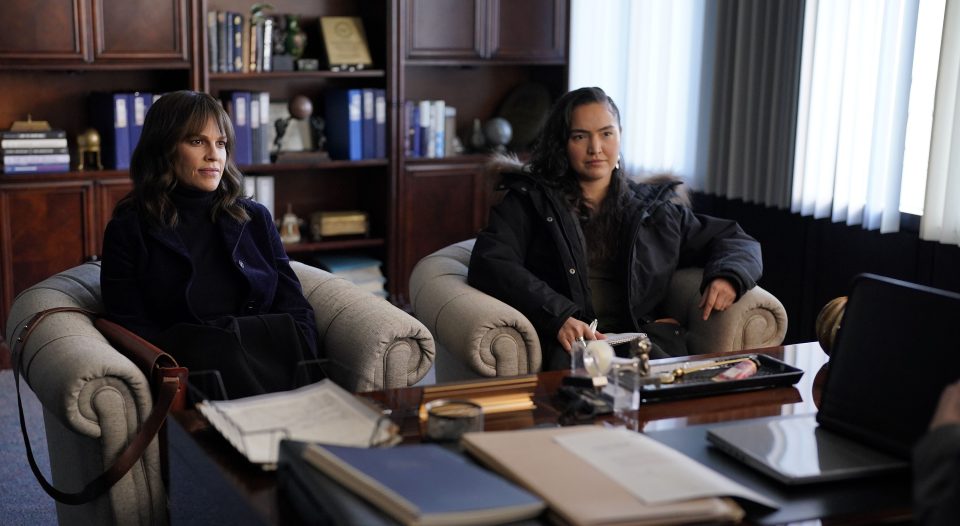Eileen Fitzgerald knows what to do. She’s never before set foot in Meade, Alaska, and doesn’t know the culture of the Indigenous people who populate it. But Eileen (Hilary Swank) is a big-city reporter, used to tangling with the most powerful people in the world.
When her colleague, Roz Friendly (Grace Dove), insists on taking the lead on their investigation in Meade, Eileen balks, choosing to storm through the community instead of following someone who knows better.
Instances such as this happen throughout the ABC-TV dramatic series Alaska Daily, an investigative reporting procedural about a struggling, Anchorage-based newspaper. In her search for the truth about the death of an Iñupiat woman, Eileen will walk over everyone, including Roz.
Inspired by the 2019 expose “Lawless: Sexual Violence in Alaska,” which earned a Pulitzer Prize for the Anchorage Daily News and Pro Publica, Alaska Daily seeks to raise awareness about the plight of missing and murdered Indigenous women in the United States. Most episodes end with a quotation from the Violence Against Women Act Reauthorization Act of 2022—“In some areas of the United States, Native American women are murdered at rates more than 10 times the national average”—followed by the declaration “The injustice of missing & murdered indigenous women must end.”
Thanks to this real-world imperative, Alaska Daily (whose creator, Tom McCarthy, won a screenwriting Oscar for the 2015 journalism drama Spotlight) contains many aspects you wouldn’t usually see in a network procedural. Unlike the cop-aganda pushed by series such as Law & Order and Criminal Minds, the show portrays police as ineffective in preventing crime and more interested in protecting their reputations than in catching criminals. In a particularly telling moment, Eileen and Roz confront Meade’s police chief, Durkin (Michael P. Northey), who justifies his department’s dismissal of the murder by suggesting that all Iñupiat engage in self-destructive behavior. “It’s just how they are,” he declares, as if making a statement of fact.
The Truth and Healing Movement provides the church with “an opportunity to increase our understanding of our colonizing impacts on Indigenous people in the past and in the present.”
Equally notable is the show’s diverse cast, which includes such Native actors as Dove (Secwépemc), Irene Bedard (Koyuk) and Martin Sensmeier (Tlingit and Koyukon-Athabascan). Alaska Daily joins other recent series with multiple Native actors, such as Rutherford Falls, Resident Alien and Reservoir Dogs. But like the first two shows, Alaska Daily centers on white characters even when Native people are the primary concern.
There’s a practical reason for this storytelling decision: even on a major network, Alaska Daily must fight for attention against a crowded media landscape, filled with numerous streaming services and video apps. But it falls into an all-too-common trope in which white heroes save the day for people of color. That’s an especially dangerous position for white Christians, who have too often complied with if not participated in oppressing and displacing Native populations in North America. By insisting that we take the lead, white Christians neither repent of our sins against Native siblings nor receive the forgiveness that Indigenous believers can offer.
Those goals drive the ELCA’s Truth and Healing Movement, which launched in April. As explained by Presiding Bishop Elizabeth Eaton, the movement provides the church with “an opportunity to increase our understanding of our colonizing impacts on Indigenous people in the past and in the present.” Because “knowing and embracing the truth is the first step toward healing for all of us,” the movement directs members to learn from their Native siblings. These opportunities include devoting the month of May to gaining awareness of missing and murdered Indigenous women.
Though Alaska Daily fails to put Native people first, it does provide a useful model for non-Native Christians, especially white Christians. Eileen comes to Alaska at a low point in her life, after a mismanaged story reveals how poorly she treats colleagues. The experience allows her to grasp the shortcomings in her perspective, which opens her to learning from Roz.
That learning doesn’t come easily. Shortly before their charged meeting with Chief Durkin, Eileen violates Roz’s trust by enlisting help from her half brother Derek (Kindall Charters). This gets Eileen the information she wants, but it also separates her from her partner.
“You may not want to admit it, but you need me on this investigation,” Roz tells her. “So I gotta be able to trust you. I’m not a sidekick.”
Eileen needs to heed Roz’s warning if she wants to deliver her story. But non-Native Christians need to heed a similar warning if we want to seek the justice God demands and the forgiveness God offers.
Alaska Daily can be seen via streaming at Hulu.





